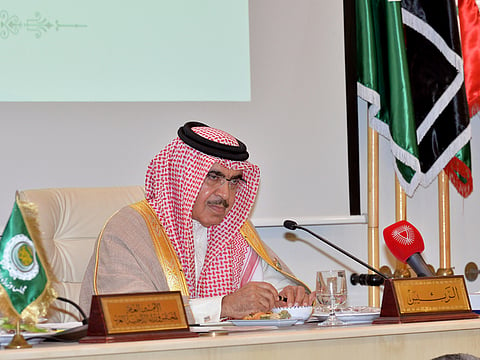Arab ministers condemn Iran's hegemony drive
'Revolutionary Guard, Hezbollah, media are used to further Tehran's agenda'

Manama: Shaikh Rashid Bin Abdullah Al Khalifa, Bahrain Interior Minister, said that the aim of the Iranian interference in the Arab countries is to achieve Persian hegemony in the region and warned that those who endorsed the Guardianship of the Jurist (Juristocracy) should move out.
“The Iranian interference is considered to be a threat to a number of countries in the region,” Shaikh Rashid Bin Abdullah Al Khalifa said. “Their interference includes support for terrorism, promoting chaos, and political interference. The goal is to achieve Persian domination over Arabism with the use of the Revolutionary Guards and Hezbollah. Even Iran's media groups play a role,” Shaikh Rashid said as he chaired the 33rd session of Arab Interior Ministers in the Tunisian capital Tunis on Wednesday.
Despites all calls for Iran to stop its interference and to respect the sovereignty of states, it continued to support terrorism, he added.
“We in Bahrain have dealt with this danger by publicising evidence of the interference and exposing failed Iranian-backed terrorist plots. Several people have lost their lives and thousands have been injured in our fight against this terrorism. This threat is not new to us and we reject the claim that such dangerous interference is merely a news item as it is a legal violation criminalzed by international covenants. We also regret that threat come from Arab countries,” Shaikh Rashid said.
The minister said that Bahrain has not interfered in any country's internal affairs and does not accept threats to its security and to its Arab status.
“We will protect our society from all types of sectarian threats and foreign allegiances, such as Guardianship of the Jurist. Those who support it should move to it. Arabism has co-existed alongside a diversity of sects and races, but has always protected itself from all foreign greed and abuses,” he said, "and is protected from greed and foreign interference.”
The minister said that the protection of regional security was a joint responsibility and that recent cooperation in counterterrorism operations has demonstrated the success of common Arab efforts in stopping terrorism that threatened countries and identities.
“Currently, Arab countries are witnessing a variety of conflicts. Arabs have become refugees and the refugee issue has become a humanitarian crisis that burdens a number of countries. This problem grows only with the continuation of violence, killing and political escalation, with no indication that terrorism and sectarianism will be eliminated. Even places of worship are targeted. To achieve stability, there is a need for collective strategies to confront such dangers. We must consider all aspects of the problems we face. From our past experiences we know the importance of commitment to national and regional security,” he said.
Shaikh Rashid suggested the formation of a team under the General Secretariat to study overall Arab security and to provide proposals and recommendations to achieve security and stability in the Arab countries.
The “Tunisia Declaration to Fight Terrorism” issued by the interior ministers denounced all forms and sources of terrorism and financing and condemned the attack against the Saudi embassy in Iran and the harsh treatment of Saudi diplomats and their families.
The ministers also condemned the kidnapping of Qataris in Iraq and the Iranian practice of attempting to destabilize the security and stability of Bahrain and other Arab countries, in addition to the dangerous practices of Hezbollah to disturb security and social peace in some Arab countries.
They announced their backing of the Arab alliance and efforts to support the legitimacy in Yemen and to confront Al Qaeda, Daesh and Houthi militias.
Sign up for the Daily Briefing
Get the latest news and updates straight to your inbox



